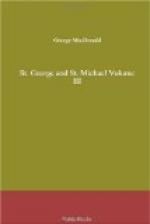So things looked ill for the puritans in general, and Richard Heywood had his full portion in the distribution of the evils allotted them. Following lord Fairfax, he had shared his defeat by the marquis of Newcastle on Atherton moor, where of his score of men he lost five, and was, along with his mare, pretty severely wounded. Hence it had become absolutely necessary for both of them, if they were to render good service at any near future, that they should have rest and tending. Towards the middle of July, therefore, Richard, followed by Stopchase, and several others of his men who had also been wounded and were in need of nursing, rode up to his father’s door. Lady was taken off to her own stall, and Richard was led into the house by his father—without a word of tenderness, but with eyes and hands that waited and tended like those of a mother.
Roger Heywood was troubled in heart at the aspect of affairs. There was now a strong peace-party in the parliament, and to him peace and ruin seemed the same thing. If the parliament should now listen to overtures of accommodation, all for which he and those with whom he chiefly sympathised had striven, was in the greatest peril, and might be, if not irrecoverably lost, at least lost sight of, perhaps for a century. The thing that mainly comforted him in his anxiety was that his son had showed himself worthy, not merely in the matter of personal courage, which he took as a thing of course in a Heywood, but in his understanding of and spiritual relation to the questions really at issue,—not those only which filled the mouths of men. For the best men and the weightiest questions are never seen in the forefront of the battle of their time, save by “larger other eyes than ours.”
But now, from his wounds, as he thought, and the depression belonging to the haunting sense of defeat, a doubt had come to life in Richard’s mind, which, because it was born in weakness, he very pardonably looked upon as born of weakness, and therefore regarded as itself weak and cowardly, whereas his mood had been but the condition that favoured its development. It came and came again, maugre all his self-recrimination because of it: what was all this fighting for? It was well indeed that nor king nor bishop should interfere with a man’s rights, either in matters of taxation or worship, but the war could set nothing right either betwixt him and his neighbour, or betwixt him and his God.
There was in the mind of Richard, innate, but more rapidly developed since his breach with Dorothy, a strong tendency towards the supernatural—I mean by the word that which neither any one of the senses nor all of them together, can reveal. He was one of those young men, few, yet to be found in all ages of the world’s history, who, in health and good earthly hope, and without any marked poetic or metaphysical tendency, yet know in their nature the need of conscious communion with the source of that nature—truly the veriest absurdity if there be no God, but as certainly the most absolute necessity of conscious existence if there be a first life from whom our life is born.




